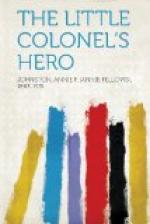“It is one of the prettiest things that my wondah-ball has unrolled,” she said to herself, “and it has certainly taught me a lesson. Poah little Fidelia! If I’d only known that she cared, there were lots of times that she could have gone with us, and it would have made her so happy. If I had only put myself in her place when mothah told me! But I was so cross and hateful I enjoyed bein’ selfish. Now all the bein’ sorry in the world won’t change things!”
It would be too much like a guide-book if this story were to give a record of the next two weeks. Betty’s good-times book was filled, down to the last line on the last page, and the partnership diary had to have several extra leaves pasted inside the cover. From morning until night there was a constant round of sightseeing. The shops and streets of London first, the Abbey and the Tower, a hundred places that they had read about and longed to see, and after they had seen, longed to come back to for another visit.
“We can only take a bird’s-eye view now and hurry on, but we must certainly come back some other summer,” said Mr. Sherman, when Lloyd wanted to linger in the Tower of London among the armour and weapons that had been worn by the old knights, centuries ago. He repeated it when Betty looked back longingly at the Poets’ Corner in Westminster Abbey, where the great organ was echoing down the solemn aisles, and again when Eugenia begged for another coach ride out to Hampton Court.
“’Gay go up and
gay go down
To ring the bells
of London town,”
sang the Little Colonel. “I am having such a good time that I’d like to stay on right heah all the rest of the summah.”
But she thought that about nearly every other place they visited, Windsor, and Warwick Castle, and Shakespeare’s birthplace,—the quaint little village on the Avon; Ambleside, where they took the coach for long rides among the lakes made famous by the poets who lived among them and made them immortal with their songs.
From these English lakes to Scottish moors, from the land of hawthorne to the land of heather, from low green meadows where the larks sang, to the highlands where plaided shepherds watched their flocks, they went with enthusiasm that never waned. They found the “banks and braes o’ Bonnie Doon,” and wandered along the banks of more than one little river that they had loved for years in song and story.
“Haven’t we learned a lot!” exclaimed Eugenia, as they journeyed back by rail to Liverpool, where the Shermans and Betty were to take the steamer. “I’m sure that I’ve learned ten times as much as I would in school, this last year.”
“And had such a lovely time in the bargain,” added Lloyd. “It’s goin’ to make a difference in the way I study this wintah, and in what I read. If we evah come ovah heah again, I intend to know something about English history. Then the places we visit will be so much moah interestin’. I’ll not spend so much time on fairy tales and magazine stories. I’m goin’ to make my reading count for something aftah this. It was dreadfully mawtifyin’ to find out that I was so ignorant, and how much there is in the world to know, that I had nevah even heard of.”




